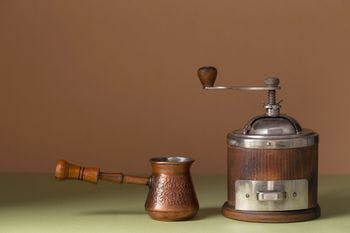
Electric vs Manual Coffee Grinders: Which is Better For You?

Are you a coffee enthusiast particular about your daily cup of coffee? Then you probably know the importance of freshly ground coffee beans for a delectable cup and when it comes to fresh ground coffee how we can forget the grinders that are the main hero of the story?
The debate between electric and manual coffee grinders has been brewing for some time now. Each grinder has its own set of devotees who swear by its advantages.
In this article, I will share with you the complete details about these two coffee champions, explore the pros and cons of electric and manual coffee grinders, the difference between manual and electric grinders for coffee grinding, and help you decide which one is the perfect fit for your coffee ritual.
Let’s start.
Electric coffee grinders overview
What is an electric coffee grinder?
An electric grinder is an automatic coffee grinder that uses electricity. This modern marvel embracing convenience takes the manual grunt work out of the coffee-making process. Best known for their efficiency, they are a savior that helps achieve a consistent grind size, which makes them an attractive choice for coffee enthusiasts.
Benefits of using electric coffee bean grinders
1) Consistency
Electric grinders yield consistent results by grinding coffee beans precisely as per your desired level of coarseness or fineness. It ensures uniform extraction and yields a balanced cup of coffee.
2) Saves time
Electric grinders are quick and efficient, reducing the time spent grinding coffee beans. It is perfect for busy mornings when you need a quick caffeine fix without delay.
3) Customization
Electric grinders come with different adjustable settings that allow you to fine-tune your grind size as per your brewing method, whether it's French press, espresso, or pour-over. This feature of customization helps enhance your coffee experience.
4) Preserve flavors
Electric grinders typically boast a sealed hopper and container, that aid in preserving the freshness and flavor of your coffee beans. It protects the beans from exposure to air, moisture, and light, which can affect their quality and degrade them.
5) Ease of use
Electric grinders are user-friendly, making them reliable for both beginners and experienced coffee enthusiasts. Just with a click of a button, you can achieve your desired grind size, doesn't it sound like a genie doing that for you?
6) Eliminate manual intervention
Unlike manual grinders, you don't have to make any physical effort to grind the beans using electric grinders if you are lazy like me or have mobility or strength limitations then this is a huge advantage.
7) Versatility
Electric grinders are versatile and can brew coffee for various brewing methods, from espresso to cold brew. If you are a coffee scientist who loves to experiment with ingredients and brewing parameters then electric grinders are a practical choice for you.
8) Better precision
Electric grinders are best for precise measurement, allowing you to grind the exact amount of coffee you need for your brew. If you always end up brewing more than required then these brewers can help you minimize waste and ensure consistent taste.
9) Multiple brews
If you brew large coffee batches for a group, electric grinders are your go-to grinder as they can easily handle larger quantities of coffee beans, which makes them suitable for both solo and group brewing.
Disadvantages of using electric coffee grinders
1) High cost
Electric grinders often come with a higher price tag compared to their manual counterparts. This initial cost might not align with the budget of coffee enthusiasts looking for more economical options.
2) Space constraints
Electric coffee grinders tend to be bulkier and need additional counter or storage space, a factor that can be inconvenient for those with limited kitchen counter space.
3) Noise
Electric grinders produce noise during use, which can be annoying, especially in tranquil morning settings. If you prefer a serene start to your day, the noise might pose an issue.
4) Complexity
Certain electric grinders boast a plethora of settings and functions that could be overwhelming for beginners. Adjusting grind sizes and configurations might necessitate a learning curve, increasing the device's complexity.
5) Maintenance and cleaning challenges
Cleaning and maintaining electric grinders can be difficult due to their internal components and electrical parts, adding to the inconvenience for individuals seeking a low-maintenance solution.
6) Heat emission
Electric grinders may generate heat while operating, potentially impacting the coffee's flavor by altering its essential oils and aroma.
7) Limited portability
Electric grinders are generally less portable than their manual counterparts, making them less suitable for coffee lovers who wish to relish freshly ground coffee while on the go.
8) Durability concerns
Some electric grinders might not be able to stand the test of time. Over time, their electrical components might deteriorate, necessitating replacement or repair, potentially causing long-term issues.
Manual coffee grinders overview
What is a manual coffee grinder?
A manual coffee grinder, often referred to as a hand coffee grinder is a traditional, non-electric device used for grinding coffee beans. It depends on human power to grind the beans.
Manual coffee grinders are typically compact, portable, and known for producing consistent and flavorful coffee grounds, making them a popular choice among those who appreciate the experience of manual brewing.
Benefits of using handheld coffee bean grinders
1) Portability
Handheld coffee grinders are compact and lightweight which makes them ideal for travelers and outdoor enthusiasts. It can be easily used for camping, hiking, or on any adventure to enjoy freshly ground coffee on the go.
2) Quiet operation
In contrast to electric grinders, manual coffee grinders operate silently which is a significant advantage for those who prefer a peaceful, noise-free coffee preparation process, especially in the early morning or quiet environments.
3) Consistency
Manual grinders provide complete control over the grind size, resulting in more consistent coffee grounds. It is crucial for ensuring a uniform extraction and a flavorful cup of coffee.
4) Durability
Manual coffee grinders are marked for their robust and durable construction. They have fewer mechanical parts that are prone to breakage, making them a reliable choice for coffee lovers.
5) Affordability
Handheld coffee grinders are generally cost-effective as compared to their electric counterparts. They are a reliable option for those who want to enjoy freshly ground coffee without breaking the bank.
6) Adjustability
Most manual grinders come with adjustable settings, allowing you to adjust the grind size to match your brewing method. This flexibility is appreciated by coffee enthusiasts who experiment with various coffee styles.
7) Minimal heat generation
Manual coffee grinders produce minimal heat during the grinding process, which aids in preserving the coffee's essential oils and aroma. It results in a flavorful cup of coffee with a rich and full flavor profile.
8) Ease of cleaning
Manual coffee grinders are comparatively easy to clean and maintain. They have fewer internal components, which makes cleaning quick and hassle-free.
9) Enhanced flavor
The slow and manual grinding process results in a more controlled extraction, embracing the full potential of the coffee beans. Coffee ground with a manual grinder often tastes fresher and more vibrant.
Disadvantages of manual coffee bean grinders
1) Time constraint
Manually grinding coffee takes time and effort especially when you are brewing large batches. It requires human assistance as compared to electric grinders, which might not be suitable for those seeking convenience.
2) Grind size adjustments
While manual grinders offer control over grind size, adjusting and finding your perfect grind can be a trial-and-error process. If you experiment frequently with brewing methods, this might pose a challenge.
3) Limited capacity
Manual grinders might not work for brewing large batches due to their smaller bean hoppers and chambers. This limits the quantity of coffee you can grind in one go, making them not preferable for large gatherings or serving multiple people.
4) Durability
Despite their sturdy construction, many manual grinders might not be as resilient as electric ones. Over time, components may wear out, leading to the need for replacement or repairs.
5) Consistency issues
Achieving uniform grind can be challenging with manual grinders, particularly for coarser grinds. It may impact the overall quality of your brew.
6) Lacks customization settings
Manual grinders don't have modern features like programmable settings or automatic shut-off timers found in electric grinders, which can add to convenience.
7) Price factor
While manual grinders are generally more budget-friendly, premium hand grinders can be quite expensive.
Electric vs manual coffee grinders: Quick comparison
1) Consistency
Electric grinders result in more precise and consistent grind sizes as it works on a motorized grinding mechanism while manual grinders can produce consistent grinds but it requires more effort to achieve the same level of consistency.
2) Grinding mechanism
Electric grinders operate using powerful motors and burrs to grind beans efficiently while manual grinders rely on the hand-brewing mechanism for grinding.
3) Grinding time
Electric grinders are quick and require minimal effort for grinding coffee beans while manual grinders take longer and require physical effort from the user.
4) Ease of cleaning
Cleaning electric grinders can be more challenging due to internal components and electrical parts while manual grinders are easier to clean and maintain because of their simpler design.
5) Portability
Electric grinders are less portable and require a power source, limiting their use in outdoor or travel settings while manual grinders are compact, lightweight, and ideal for travelers, outdoor enthusiasts, and camping trips.
6) Durability
High-quality electric grinders are durable, but their internal components may wear out over time while manual grinders are known for their robust and durable construction, with fewer parts that can break.
7) Noise
Electric grinders can be noisy during operation, which can be disruptive in quiet environments while manual grinders mostly operate silently and are ideal for those who prefer a quiet coffee preparation process.
8) Maintenance
Electric grinders may require maintenance or repair of electrical parts while manual grinders have fewer parts to maintain and are less prone to breakage. So if you are clumsy like me pick the manual coffee grinder.
9) Convenience
Electric grinders offer convenience in terms of speed and automation while manual grinders require more effort but are appreciated by those who enjoy a hands-on coffee-making experience.
10) Price range
Electric grinders have a wide price range, with premium models often being more expensive. In contrast to electric grinders, manual grinders are generally more budget-friendly but can also have high-end options.
11) Customization
Some electric grinders offer programmable settings and features for customized grinding while manual grinders may have adjustable settings, allowing users to customize grind sizes.
Manual or electric coffee grinding machine: Which is better for you?
The choice between a manual and an electric coffee grinder varies as per personal preferences. Each type has its own set of advantages and disadvantages.
If you appreciate a hands-on coffee-making experience or prefer a portable grinder for travelling then manual grinders are ideal. Also, it is budget-friendly and aesthetically appealing.
If you need to brew large batches and want a hassle-free brewer that can work without any human intervention then electric grinders are perfect. They are also convenient and time-saving, making them suitable for busy mornings.
To determine which one suits you, consider your brewing habits, available time, portability, budget, and your preference for hands-on or automated coffee preparation.
Wrapping up
Here, I have got you covered with the difference between electric and manual coffee grinders. Both coffee champions are wonderful for brewing flavorful cups of coffee. Now list out your needs and pick a grinder that fits your requirements..
FAQs
1) Are blade or burr grinders best?
Burr grinders are generally preferred for consistent grind sizes, making them the preferred choice for those seeking high-quality coffee while burr grinders are more budget-friendly but may yield uneven grind sizes, affecting the coffee's flavor.
2) Why is a conical grinder best?
A conical grinder is favored for its ability to produce a wider range of grind sizes, making it versatile for various coffee brewing methods.
3) Do old coffee grinders work well?
Old coffee grinders can still work well if they are maintained well and are in good condition. However, newer models may offer improved performance and features.
4) Why should you grind coffee beans on your own?
Grinding coffee beans fresh preserves their flavor and aroma, resulting in a more delicious cup of coffee compared to pre-ground coffee. It also allows you to customize the grind size for your preferred brewing method.
5) How often do you clean an electric coffee grinder?
Regular cleaning is recommended to maintain an electric coffee grinder's performance. It's ideal to clean it thoroughly after every use but a quick brush or wipe between uses can also help when running late.

I am a barista by profession hailing from NC. My journey began in my late teens when I started working as a barista in a local coffee shop. My passion for coffee quickly became evident as I immersed myself in the art of espresso extraction, latte art ...




